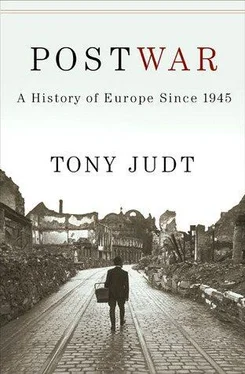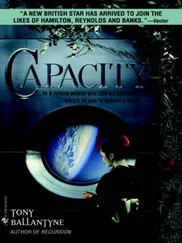IV. The Impossible Settlement
‘Those who were not alive at the time may find it difficult to appreciate the extent to which European politics in the post-war years were governed by the fear of a German revival and directed to making sure that this never happened again’.
Sir Michael Howard
‘Make no mistake, all the Balkans, except Greece, are going to be Bolshevised, and there is nothing I can do to prevent it. There is nothing I can do for Poland, either’.
Winston Churchill, January 1945
‘Reminded me of the Renaissance despots—no principles, any methods, but no flowery language—always Yes or No, though you could only count on him if it was No’.
Clement Attlee on Stalin
‘In the space of five years we have acquired a formidable inferiority complex’.
Jean-Paul Sartre (1945)
‘Nobody in the world can understand what Europeans feel about the Germans until one talks to Belgians, Frenchmen or Russians. To them the only good Germans are dead Germans.’ The author of these words, written to his diary in 1945, was Saul K. Padover, the observer with the American armies whom we met in Chapter Three. His observation should be borne in mind in any account of the post-war division of Europe. The point of the Second World War in Europe was to defeat Germany, and almost all other considerations were set aside so long as the fighting continued.
The Allies’ chief wartime concern had been to keep one another in the war. The Americans and British worried incessantly that Stalin might make a separate peace with Hitler, especially once the Soviet Union had recovered territory lost after June 1941. Stalin, for his part, saw the delay in establishing a Second (Western) Front as a ploy by the Western Allies to bleed Russia dry before coming forward to benefit from her sacrifices. Both parties could look to pre-war appeasement and pacts as evidence of the other’s unreliability; they were bound together only by a common enemy.
This mutual unease illuminates the wartime accords and understandings reached by the three major Allied governments. At Casablanca, in January 1943, it was agreed that the war in Europe could only end with an unconditional German surrender. At Teheran, eleven months later, the ‘Big Three’ (Stalin, Roosevelt and Churchill) agreed in principle upon a post-war dismantling of Germany, a return to the so-called ‘Curzon Line’ [21] The frontier between Poland and Soviet Russia as proposed by the British Foreign Secretary after the First World War.
between Poland and the USSR, recognition of Tito’s authority in Yugoslavia and Soviet access to the Baltic at the former East Prussian port of Königsberg.
The obvious beneficiary of these agreements was Stalin, but then since the Red Army played by far the most important role in the struggle with Hitler, this made sense. For the same reason, when Churchill sat down with Stalin in Moscow in October 1944 and initialed the notorious ‘percentages agreement’, he was merely conceding to the Soviet dictator ground that the latter was already sure to seize. In this agreement, scribbled in haste by Churchill and passed across a table to Stalin who ‘took his blue pencil and made a large tick upon it’, Britain and the USSR agreed to exercise control over post-war Yugoslavia and Hungary on a 50:50 basis; Romania would be 90 percent under Russian control and Bulgaria 75 percent, while Greece would be 90 percent ‘British’.
Three points are worth making about this secret ‘deal’. The first is that the percentages for Hungary and Romania were purely formulaic: the real issue was the Balkans. Secondly, the deal was largely upheld on both sides, as we shall see. But thirdly, and however heartless this must seem from the point of view of the countries concerned, it really wasn’t significant. The same applies to the discussions at Yalta in February 1945. ‘Yalta’ has entered the lexicon of central European politics as a synonym for Western betrayal, the moment when the Western Allies sold out Poland and the other small states between Russia and Germany.
But Yalta actually mattered little. To be sure, the Allies all signed the Declaration on Liberated Europe—‘To foster the conditions in which the liberated peoples may exercise those [democratic] rights, all three governments will jointly assist the people in any European liberated state or former Axis satellite state in Europe…’ to form representative governments, facilitate free elections, etc. And it was the postwar cynicism of the Soviet Union with regard to this commitment that would be thrown in the face of the West by understandably aggrieved spokesmen for the imprisoned nations. But nothing was decided at Yalta that had not already been agreed at Teheran or elsewhere.
The most that can be said of the Yalta Conference was that it offers a striking study in misunderstanding, with Roosevelt in particular a victim of his own illusions. For by then Stalin hardly needed Western permission to do whatever he wished in eastern Europe, as the British at least understood perfectly well. The eastern territories ceded to Stalin under the secret protocols of the Nazi-Soviet pacts of 1939 and 1940 were firmly in Soviet hands once again: at the time of the Yalta meeting (February 4th-11th 1945) the ‘Lublin Committee’ of Polish Communists brought west in the Soviet baggage train to run post-war Poland was already installed in Warsaw. [22] Stalin had broken off relations with the Polish government-in-exile in London in 1943 following the latter’s demand for an international examination of the Katyn massacre. The Germans, who uncovered the site, correctly claimed that it was the location of a mass execution by the Soviets of captured Polish officers. The Soviet authorities and their Western supporters, then and for the next half century, angrily denied it.
In fact, Yalta left the truly important issue—arrangements for post-war Germany—off the table precisely because it was so important and intractable. And it is unlikely that the Western leaders could have got a better deal out of Stalin during these last months of the war, even if it had occurred to them to try. The only hope for the Poles and others was that Stalin would be generous to them in return for Western goodwill. But he had the latter in any case, and long after the defeat of Hitler it was the Western Allies who sought Stalin’s cooperation, not the other way around. The Soviet Union had to be kept in the war against Germany (and later, as it was then supposed, Japan); the problem of central Europe could wait upon the peace. Had it been otherwise Roosevelt and Churchill might have protested more strongly in August 1944, when 200,000 Poles were killed by the Germans in a hopeless uprising in Warsaw while the Red Army looked on from the other side of the Vistula.
Western leaders may not have shared Stalin’s view of the Poles’ underground Home Army as ‘a handful of power-hungry adventurers and criminals’, but they were certainly not about to antagonize their major military ally just six weeks after the D-Day landings in Normandy. For Poles then and since this was a betrayal of the very purpose of the war—after all, Britain and France had declared war on Hitler in September 1939 over his violation of Poland. But for the Western Allies the case for leaving Stalin a free hand in the east was self evident. The point of the war was to defeat Germany.
This remained the primary impulse to the very end. In April 1945, with Germany already beaten in all but name, Roosevelt could still declare that, even with regard to post-war arrangements for Germany itself, ‘our attitude should be one of study and postponement of final decision.’ There were good reasons for taking this stance—the search for a settlement of the German Question was going to prove horribly difficult, as perceptive observers could already see, and it made sense to sustain for as long as possible the anti-German alliance that bound the wartime partners together. But as a result, the shape of post-war Europe was dictated in the first instance not by wartime deals and accords but rather by the whereabouts of occupying armies when the Germans surrendered. As Stalin explained to Molotov, when the latter expressed doubts over the wording of the well-meaning ‘Declaration on Liberated Europe’: ‘We can fulfill it in our own way. What matters is the correlation of forces.’
Читать дальше












